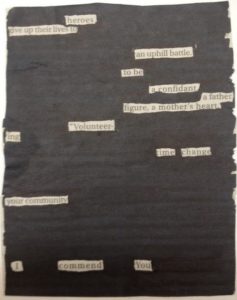There are many types of found poetry. One of the most rewarding is blackout erasure poetry. The challenge with this form is to find your voice and an idea that is hiding in an existing text. You begin with a page of found text. Compose by selecting words to save. Finally “erase” by covering up all but a few select words. Not only will you create a poem with this process, but also create a visually stunning work.
Supplies
- You will need a method of covering up the discarded text. This could include:
-
- Marker/Pencil to black out
- White-out or correction tape
- Scissors, paper, paste/glue
- Find some text. A few ideas for sources:
- Mail circular or letter
- Page from book to be recycled
- Article from newsprint or magazine
- Pencil, erasable highlighter, or other method of selecting words to keep.
Method
- Draft
It is recommended to use a pencil or some other method to identify and select the words you want to keep that can be reversed (such as erasing an underlining in pencil). This lets you draft, edit, and compose until you have a final draft.
- Erase
With the words to keep carefully selected, you can now go about covering up the remaining text.
- Share
This is such a visually striking poetry, you will want to share and save the end result. An easy first step is to share an image of your finished poem with your family, friends, or even the library over social media. You may even want to paste it into your journal to keep and revisit again later.
Recommended Reading
If you are looking for more experience with poetry, here are a few selections that each have a vastly different type of appeal:
-
- Aug 9-fog (book)
by Kathryn Scanlan
The author uses a real woman’s diary found in an estate sale an transforms it into a moving experience of found poetry.
-
- (book)
by Pierre Alex Jeanty
A collection of poetry and prose about the strengths and beauty that can only be discovered in women.
-
- Faithful and Virtuous Night (book)
by Louise Glück
The author is the winner of the Nobel Prize in Literature and winner of the 2014 National Book Prize for Poetry.
-
- Citizen: An American Lyric (ebook and book)
by Claudia Rankine
This text uses images, poetry, and essays to explore the cumulative impact of racial aggression in our culture.




Add a comment to: Found Poetry